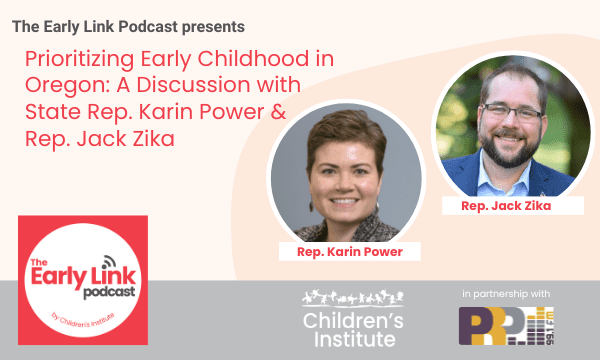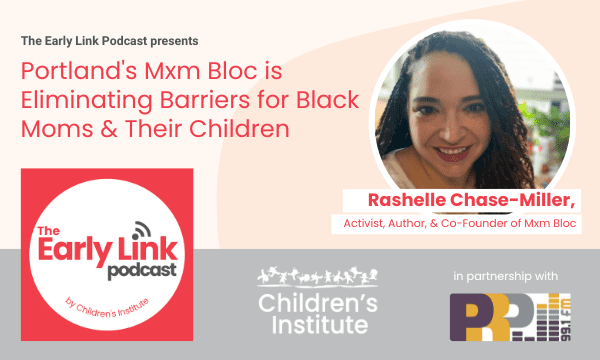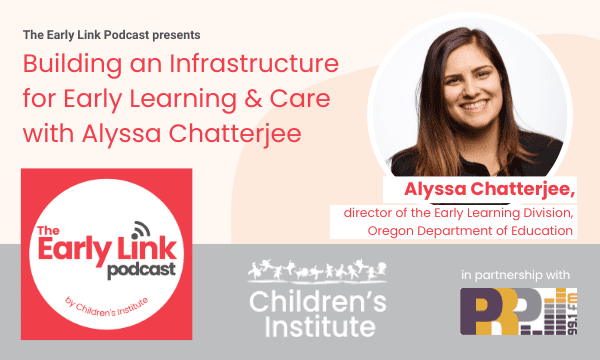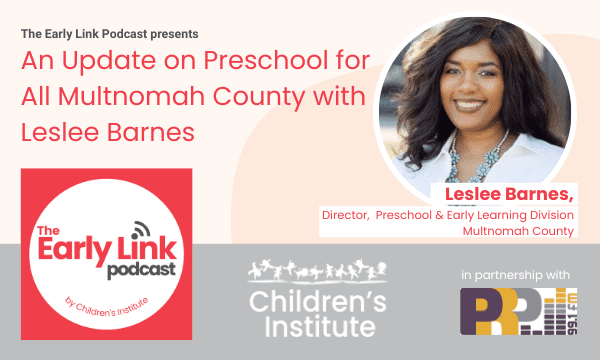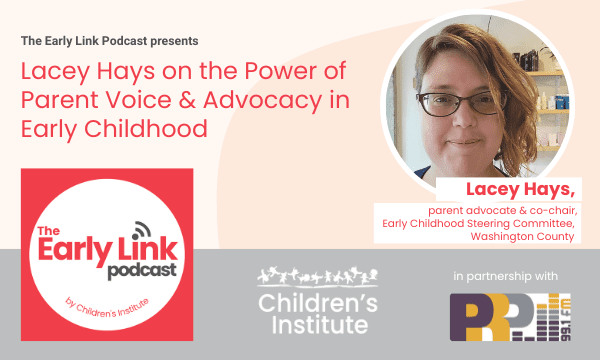
Lacey Hays on the Power of Parent Voice & Advocacy
On this episode of the Early Link Podcast, host Rafael Otto speaks with Lacey Hays, a parent and advocate in Washington County here in Oregon. She’s currently co-chair for the Early Learning Washington County Steering Committee and a member of both the Preschool for All Technical Advisory Committee and the Organizing and Outreach Committee. All of that work is in support of establishing Preschool for All in Washington County.
Guest:
Lacey Hays has lived with her wife, eight-year-old son, and a menagerie of pets in Hillsboro, Oregon on the border of where the city meets the forest. For the past seven years she’s been a strong parent voice for equitable early childhood education and early childhood special education in Washington County and the state of Oregon, participating in and, at times, chairing committees dedicated to creating policies that work for parents and providers in our community. When she takes off her advocacy hat, she can be found editing manuscripts, writing hopeful science fiction stories, and exploring the vast and beautiful wild places of Oregon with her wonderful family.
Summary:
In this segment, Hays shares the story of her son and how he has helped drive her advocacy work. As an active parent advocate in Washington County, she details all of the work she is currently involved in and how she balances being a parent. Hays also speaks to the importance of parent voice in policy development and improving access to various parts of the early childhood system, such as early intervention, special education, and preschool. Because of Hays’ involvement with the implementation of Preschool for All (PFA) in Washington County, she also addresses the similarities and differences between Washington and Multnomah County’s PFA strategies, and what she hopes to achieve with it in the future.
Transcript
[00:00:00] Rafael Otto: Hello everyone. This is the Early Link Podcast. I’m Rafael Otto. I appreciate you tuning in. You can catch us on 99.1 FM in the Portland Metro on Sundays at 4:30 pm or tune in at your convenience, wherever you find your podcasts, including iTunes, Spotify, and Amazon Music. And as always on our website @ childinst.org. You can visit us there and stay up to date by subscribing to our newsletter and podcasts. Today, I’m speaking with Lacey Hays, a parent and advocate in Washington County here in Oregon. She’s currently co-chair for the Early Learning Washington County Steering Committee and a member of both the Preschool for All Technical Advisory Committee and the Organizing and Outreach Committees. All of that work is in support of establishing Preschool for All in Washington county.
Lacey, it’s great to have you on the podcast today.
[00:00:51] Lacey Hays: Thank you for having me.
[00:00:53] Rafael Otto: Lacey, would you be willing to share the story of your son? Because in talking with you, it’s my understanding that… that has been a driver for what you’re doing these days as an advocate for young children. Would you mind sharing that story with us?
[00:01:06] Lacey Hays: Yeah, my son is the reason for all of this. He was born in 2013, just a normal childbirth. And for the first few months of his life seemed to be, or everyday typical baby, sleeping, crying, eating. And around sixteen months though, we started to notice that while he was walking and crawling and meeting other milestones, he still wasn’t speaking. So we weren’t getting “mama,” we weren’t getting pointing. So during his 16 month checkup, we talked to his doctor and she said, “Hey, I can send you guys over to early intervention, but if you guys wanted to wait just a month or two, just to see if he catches up, because it’s still a little early and he’s not outside the range of normal we can do that, too.”
We got the early intervention referral in and we decided we were going to wait before we actually called on it. At about 17 months, we were giving him a bath. We had these little foam letters that you can stick to the wall in the bathtub and we’d tell him the letter name. And so he picks up the “O” and he goes, “Ooh.” And I look at him and I’m like, “Well that’s just a coincidence. Babies make lots of noises.” So we stuck it to the wall and he picks up the “T” and he goes, “Te.” I’m like, “Okay, that’s getting kind of strange.” So I pick up the “E” and he goes, “Eh.” I’m like, “Okay.” I have a background in English education. It’s my degree. And one of the classes we’re required to take is language acquisition and immediately I was like, “Well, that’s very unusual, kind of backwards language acquisition. He can’t speak, but he’s reading letters. This is really unusual.” So we went to early intervention and we found out that he had a receptive and expressive language delay.
They also looked and said, “Does he ever stop moving?” He’s my only child. I said, “well, no, but he’s one. It’s not normal?” And they said, “Well, he’s moving a little bit more than you would expect for a, for a one-year-old, 12 months plus.” They thought that maybe he wasn’t slowing down long enough to focus on the environment around him to actually take in language.
[00:03:28] Rafael Otto: Okay.
[00:03:30] Lacey Hays: So we went on this adventure with early intervention. We started having home visits and they were wonderful. Our teacher, Amy, is still holds a really special place in our heart. And as we started exploring more over the next year. We realized that he could also read a little bit by the time he was two. He wouldn’t do it on cue, but he would just read something off of a sign every once in a while.
Please download the full transcript below.

